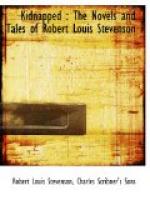“It’s to risk the brig, sir,” said the captain, “and your own lives along with her.”
“Take it or want it,” says Alan.
“Could ye pilot us at all?” asked the captain, who was frowning to himself.
“Well, it’s doubtful,” said Alan. “I’m more of a fighting man (as ye have seen for yoursel’) than a sailor-man. But I have been often enough picked up and set down upon this coast, and should ken something of the lie of it.”
The captain shook his head, still frowning.
“If I had lost less money on this unchancy cruise,” says he, “I would see you in a rope’s end before I risked my brig, sir. But be it as ye will. As soon as I get a slant of wind (and there’s some coming, or I’m the more mistaken) I’ll put it in hand. But there’s one thing more. We may meet in with a king’s ship and she may lay us aboard, sir, with no blame of mine: they keep the cruisers thick upon this coast, ye ken who for. Now, sir, if that was to befall, ye might leave the money.”
“Captain,” says Alan, “if ye see a pennant, it shall be your part to run away. And now, as I hear you’re a little short of brandy in the fore-part, I’ll offer ye a change: a bottle of brandy against two buckets of water.”
That was the last clause of the treaty, and was duly executed on both sides; so that Alan and I could at last wash out the round-house and be quit of the memorials of those whom we had slain, and the captain and Mr. Riach could be happy again in their own way, the name of which was drink.
CHAPTER XII
I hear of the “Red fox”
Before we had done cleaning out the round-house, a breeze sprang up from a little to the east of north. This blew off the rain and brought out the sun.
And here I must explain; and the reader would do well to look at a map. On the day when the fog fell and we ran down Alan’s boat, we had been running through the Little Minch. At dawn after the battle, we lay becalmed to the east of the Isle of Canna or between that and Isle Eriska in the chain of the Long Island. Now to get from there to the Linnhe Loch, the straight course was through the narrows of the Sound of Mull. But the captain had no chart; he was afraid to trust his brig so deep among the islands; and the wind serving well, he preferred to go by west of Tiree and come up under the southern coast of the great Isle of Mull.
All day the breeze held in the same point, and rather freshened than died down; and towards afternoon, a swell began to set in from round the outer Hebrides. Our course, to go round about the inner isles, was to the west of south, so that at first we had this swell upon our beam, and were much rolled about. But after nightfall, when we had turned the end of Tiree and began to head more to the east, the sea came right astern.




